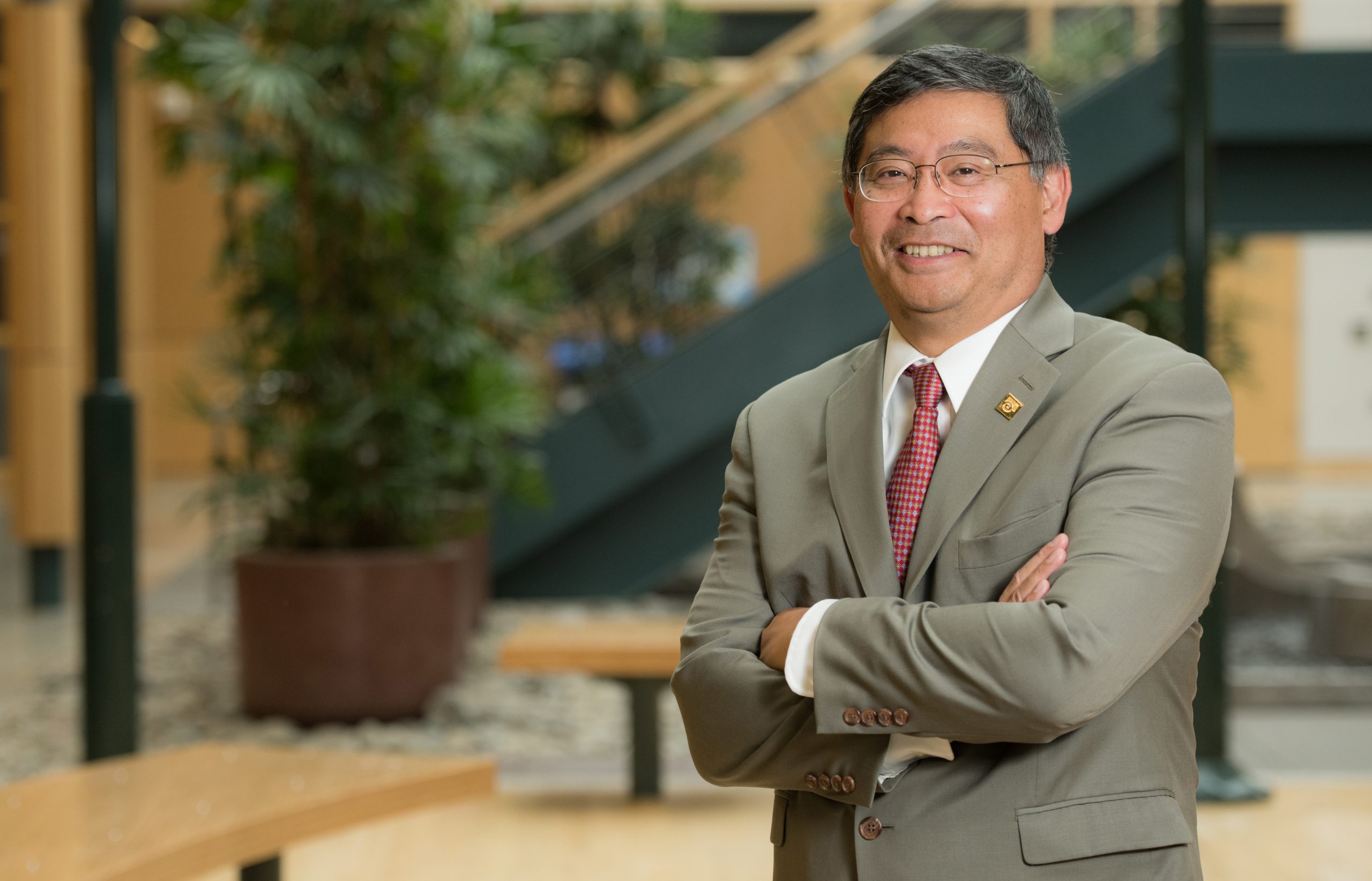This content was published: February 15, 2021. Phone numbers, email addresses, and other information may have changed.
President Mitsui talks artificial intelligence and its potential in a post-pandemic world
Story by Kate Chester. Video by Media Services.
You talk to your phone to set a reminder, play music, search the internet or navigate to a destination.
You worry about typing errors. Autocorrect has you covered.
You order a movie online and soon see other recommendations you may enjoy.
These are everyday examples of artificial intelligence, or AI, a collection of algorithms that enable machines to sense, reason, act, and adapt like the human mind would.
To those who fear it, AI marks the dawning of robots taking over the world. Others see AI as a time, money and energy saver.
In June 2019, Oregon’s Workforce and Talent Development Board established a statewide task force. Its charge is to focus on AI education and training. Co-chaired by board members Mark Mitsui, president of Portland Community College, and K.S. Venkatraman, senior director of AI computing architecture with graphics processing chip manufacturer NVIDIA, the task force comprises several private, public and educational partners.
Then COVID-19 struck.
Oregon and the nation entered into a recession virtually overnight. The state lost 272,000 jobs in two months, wiping out six years of job growth. Meanwhile, the unemployment rate soared from the lowest on record to the highest in a single month.

Investing in Oregon’s Community Colleges
PCC President Mark Mitsui joined Tim Cook, president of Clackamas Community College, and Lisa Skari, president of Mt. Hood Community College, to pen a recent op-ed for The Oregonian. The editorial stressed the importance of the state legislature investing fully in community colleges, which have been hit hard by the pandemic. With appropriate financial support, Oregon’s community colleges can revive the state’s post-COVID economy, training the next workforce generation and providing pathways to degrees.
The long path to recovery began in May as restrictions were relaxed and businesses adjusted. By July, the state had regained nearly 40 percent of the jobs lost in the early months of the pandemic. But job loss was disproportionate in its impact, affecting women and people of color, as well as low-income and rural communities the most.
“It’s hard to see the silver lining when disaster strikes,” said Mitsui, “but the pandemic will accelerate the pace of AI innovation. If our policy response is equity-based and includes a pathway to new careers through postsecondary education, we could have an opportunity to help level the playing field, re-skilling a highly diverse, highly displaced workforce who lost their jobs due to COVID.”
Venkatraman added, “AI will create dislocations, but history has shown that new technology is the engine of economic growth. More jobs were created with every major economic shift, from the industrial age, to the computer age, to the Internet era. AI will augment many jobs, and create new opportunities, improving productivity and enhancing our quality of life.”
The task force produced a comprehensive report with recommendations based on national and international research pointing to the potential of AI. Experts from sectors influencing Oregon’s economy contributed to it. The document also included a section on climate change, a burgeoning area for AI, that can assist with forecasting fires and floods, and reducing carbon emissions enabling the transition to renewable energy.
The task force submitted its recommendations to Gov. Kate Brown and the legislature, which underscore a commitment to equity, highlight outcomes-based funding and incentives, note the importance of private-public sector relationships, and outline criteria necessary to create AI programs leading to degrees and certificates at all Oregon universities and community colleges.
“If we follow this ‘recipe,’ Oregon will attract AI businesses because we’ll be developing the talent pool they need,” said Mitsui. “We’ll also be equipping Oregonians, particularly those historically marginalized communities at greatest risk of displacement by AI, with the skills, knowledge and abilities necessary to succeed in the fourth industrial revolution.”


Where do I sign up!
This is exciting, and in a good way, IF we really emphasize AI’s humane potential to bridge inequalities. Yet as Venkatraman said, “AI will create dislocations”.
To handle this threat, PCC & our partners must prioritize “humanistic AI” (a term popularized by Siri co-inventor Tom Gruber).
And so for this approach, is PCC being guided by the thought leaders in humane tech?
…such as: Tristan Harris at HumaneTech.com, Yuval Noah Harari (“21 Lessons for the 21st Century”), and especially Shoshana Zuboff of Harvard Business School. I strongly recommend her N.Y. Times piece, “The Knowledge Coup”, from late Jan.2021.
AI is an amazing tool for productivity, however, AI also poses threats to a high percentage of students with financial limitations (in conjuction with technology limitations such as: graphics cards, compatible PCs and other industry standard softwares). What will PCC do to help resolve this digital divide?